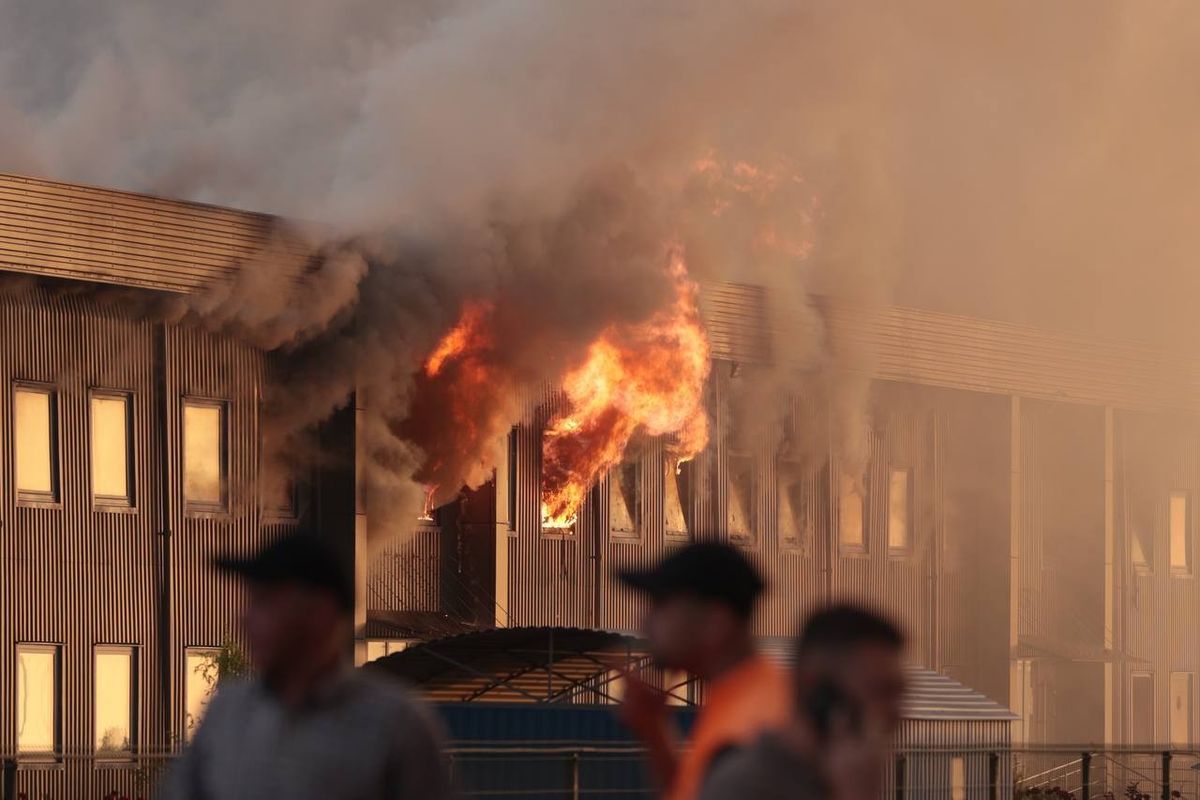Bottom Line: U.S. President Donald Trump has threatened to rain missiles on forces loyal to Syrian Bashar al-Assad, one week after they allegedly conducted a chemical weapons attack on civilians in Syria's rebel-held town of Douma, near the capital Damascus. While a potential strike may signal to Assad that the U.S. will not tolerate the use of chemical weapons, it may also lead to military escalation and possibly a direct confrontation with Russia, which supports the Assad regime and has troops based throughout the country.
Background: Throughout Syria’s seven-year civil war, the Assad regime has targeted civilians with chemical weapons, evoking international condemnation.
- Former U.S. President Barack Obama infamously drew his red line in August 2012, warning the Assad regime against the use of chemical weapons, a month after a Syrian official confirmed the regime had such weapons and threatened their use against “external aggression.” Obama warned, "We have been very clear to the Assad regime – but also to other players on the ground – that a red line for us is we start seeing a whole bunch of chemical weapons moving around or being utilized.” Obama officials credit that threat with making possible a Russia-brokered deal to get Assad to disarm.
- The Assad regime used them anyway, carrying out one of the first publicly reported chemical attacks in the western Syrian city of Homs in December 2012. But it was a series of reported attacks in August the following year that finally triggered UN censure, and visits by UN inspectors who later concluded chemical weapons were used on a “relatively large scale.” The U.S. also released its assessment that the nerve agent sarin was used on civilians in a Damascus suburb on Aug. 21, 2013, and Obama threatened to ask Congress to approve the use of force against Syria on Aug. 31st.
- Russia offered to broker a deal to avoid U.S. military action, and in September 2013, the U.S. and Russia reached an agreement that required Syria to cede to the Chemical Weapons Convention (CWC) and allow the Organization the Prohibition of Chemical Weapons (OPCW) – the international body charged with implementing the Chemical Weapons Convention – to oversee the destruction and transfer chemicals agents out of Syria. The Assad regime was given one week to provide a comprehensive list of chemical agents in its possession and the destruction of declared chemical materials began in October 2013, ultimately, being completed in mid-2014.
- Following the agreement, the United Nations Security Council passed Resolution 2118 in September 2013, which determined that the Assad regime was required to “complete the elimination of all chemical weapons material and equipment” and “cooperate fully with all aspects of the implementation of this decision, including by providing the OPCW) personnel with the immediate and unfettered right to inspect any and all sites in the Syrian Arab Republic.”
- There was an apparent pause in the use of chemical weapons like sarin during 2014-2015. But in 2016, a joint OPCW-UN mission determined chlorine gas has been used against civilians in Idlib, lending credence to other reports of its use, but that drew little response in the waning days of the Obama administration. Chlorine is not on the agreed list of prohibited substances that the Assad regime was required to destroy – although its use as a weapon is still banned under the Chemical Weapons Convention. Since then, the Assad regime has been accused of regularly orchestrating chemical attacks,.
- Since Trump took office, the Assad regime returned to the use of nerve agents in addition to using chlorine-filled barrel bombs. The Trump administration took action after the April 4, 2017, attack on the town of Khan Shaykhun in Syria’s northwestern Idlib Province, which killed more than 80 people. The Trump administration responded by launching 59 Tomahawk missiles from USS Porter and USS Ross in the eastern Mediterranean, which struck the Shayrat air base near Homs from where the chemical attack had been launched.
- On April 7, the Assad regime was accused of conducting another chemical attack, deploying chlorine in the Damascus suburb of Douma to kill more than 40 people. According to the World Health Organization at least 500 people seen at medical facilities have demonstrated symptoms of being exposed to the toxins. A statement released by the Syrian Network for Human rights claimed that the organization had “acquired a number of pictures and videos that show tens of dead bodies for women and children that are piled up” from the attack. Syria’s state news agency, Sana, cited government sources who denied the allegations, saying “does not need to use any chemical materials as claimed by terrorists’ media affiliates.”
Andy Weber, former Assistant Secretary of Defense for Nuclear, Chemical and Biological Defense

“Assad continues to commit crimes against humanity with impunity. Now is an opportunity - at long last - to restore the norm against chemical weapons use, whether in Douma or Salisbury. Syrian aviation, rotary and fixed wing, should be incapacitated. Regime command and control, used to authorize chemical weapons atrocities, should be rendered useless.”
Issue: The U.S. and international community have found no way to dissuade Assad from using chemical weapons, in large part because Russia is protecting the regime militarily and when necessary, at the UN Security Council. Unless Russia pressures Assad to disarm, he will likely continue chemical weapons use with impunity to kill his enemies or drive them to flee the country.
- Russia vetoed a U.N. Security Council resolution this week that would have condemned the most recent attack, and would have created a new independent mechanism to investigate chemical weapons attacks in Syria. Moscow claimed the resolution would be used as a pretext to attack Syria – as the U.S. Britain and France prepare for a possible punishing strike on Assad’s regime.
- Russia has cautioned the U.S. against taking military action in Syria in response to the alleged chemical attack. "I would once again beseech you to refrain from the plans that you're currently developing,” said Vasily Nebenzia, Russia’s envoy to the UN on Tuesday. He also warned that Washington will "bear responsibility" for any "illegal military adventure" it pursues. Alexander Zasypkin, Russia’s ambassador to Lebanon, also warned that “Russia vows to shoot down any and all missiles fired at Syria,” while Moscow has called the reports a “provocation” for greater Western intervention in Syria.
Adm. (ret.) Sandy Winnefeld, former Vice Chairman of the Joint Chiefs of Staff
“Russia is obviously not going to be happy that we would be taking action against their client state. They will certainly try to help Syria defend against any kind of an attack like that with, I would hope, no attempt to directly counter U.S. forces or platforms. But they may try to help Syrians counter whatever weapons are targeting Syrian facilities. And of course there’ll be all kinds of diplomatic blowback and angry rhetoric and those sorts of things. Let’s hope that’s all it is.”
Rob Richer, former CIA chief of the Near East and South Asia division
“There are little options available to the president to press Syria or Russia. The president has already indicated he has no appetite for further engagement in Syria and will withdraw and he has abdicated to Russia the upper hand in Syria. Adding further political or financial sanctions on Russia will have little if any impact and there is little we can do to influence Assad absent creating a viable and willing international coalition to take on both countries. The current president simply does not have the political gravitas to do so. And the world at large simply does not trust the President to stay a straight course and distrusts his personal relationship with Russian President Vladimir Putin.”
Response: Despite Russia’s warnings, the Trump administration appears ready to take similar action as it did in April 2017 when it launched missiles at Syrian targets in retaliation for the Assad regime’s use of chemical weapons. This time, the Trump administration is consulting with allies Britain and France, in an effort to potentially formulate a joint response that may attempt to curb the prospect of further escalation.
- On Wednesday, Trump tweeted,“Russia vows to shoot down any and all missiles fired at Syria. Get ready Russia, because they will be coming, nice and new and “smart!” You shouldn’t be partners with a Gas Killing Animal who kills his people and enjoys it!”
- On Tuesday, Trump, British Prime Minister Theresa May, and French President Emmanuel Macron agreed to form a united front and uphold the ban on chemical weapons. The three leaders have discussed potential courses of action and appear to be working in a coordinated to fashion a coordinated response.
Rob Richer, former CIA chief of the Near East and South Asia division
“Command and control nodes must to targeted to include national lines of strategic communications. With all of the tweet threats floating around, the Syrians have had time to move strategic military assets, aircraft, helps, etc., to more secure and protected environs. In short, we’ve lost the ability to hit Syrian military assets that were likely used in the Chemical/Nerve Agent attack or could be used again. The beating of our chest has taken that option off of the table. We need to hit Assad in areas which are linked to his ability to exert command and control. In short, destroy national communications and make all military airfields unusable for the long term. Take out the Syrian Ministry of Defense in Damascus and regional military command centers. The likelihood of that happening is remote.”
Amb. Laura S. H. Holgate, former Special Assistant to the President for Weapons of Mass Destruction, Terrorism and Threat Reduction
“Any strikes in connection with Assad’s brutal use of chemical weapons against his own citizens should be focused on preventing or deterring future use of chemical weapons. Targets chosen with those aims in mind could include the helicopters who deliver the barrel bombs containing chlorine or sarin, the bases from which such aircraft operate, any facility that is manufacturing those barrel bombs, and/or targets of particular personal value to Assad. In selecting from this set of targets, care must be given to avoid harm to civilians, which will be especially tricky if chemicals are present as plumes can travel unpredictably. Avoiding known areas where Russian and Iranian personnel are located would also be wise – we can’t count on Russia absorbing more deaths to their troops after the recent Twitter exchange of insults. Ideally, the U.S. strike would include French, UK, and other allied forces to make manifest the broad disgust at Assad’s continued use of these banned weapons.”
Looking Ahead: Trump warned of impending strikes on Syrian targets, and it does not seem likely that he will back down from his strong position. However, in ordering such strikes, the president risks putting the U.S. and Russia on a collision course that could generate a significantly larger crisis in the region and beyond.
Adm. (ret.) Sandy Winnefeld, former Vice Chairman of the Joint Chiefs of Staff
“It remains to be seen what level of cost imposition is required to dissuade Assad from using chemical weapons against his own people. Obviously the last even did not deter or dissuade him, and my guess is that this will be a much higher level of attack, and hopefully it will dissuade him from doing this sort of blatantly illegal and immoral behavior in the future. But we can’t read Assad’s mind, so we’re going to have to wait and see.”
Amb. Laura S. H. Holgate, former Special Assistant to the President for Weapons of Mass Destruction, Terrorism and Threat Reduction
“As last year’s ineffective strike showed, military force is best used not as a reflex but in concert with a set of diplomatic, economic and political measures with the same goals of preventing or deterring future chemical attacks. Messages to Assad are best passed quietly through Russia or others rather than shouted in public. Without a broader strategy of how to leverage military action, air strikes will fail to prevent future use, and could – by tempting Assad or his Russian protectors to retaliate harshly – make life even worse for the civilians in whose name we are claiming to act.”















